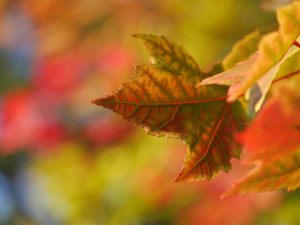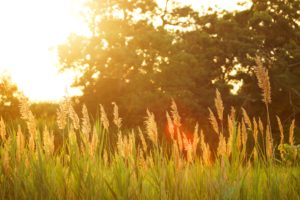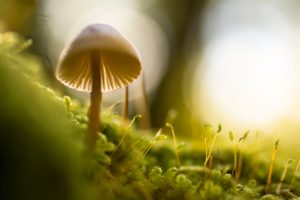Today is the Autumn Equinox. It’s cool, cloudy, and damp here in central Maine. My attic windows are open and I can hear acorns falling from our oak tree and cars going by, tires hissing on the wet road.
I’ve been reading The Enchanted Life by Dr. Sharon Blackie, and yesterday I laid the book in my lap as I sat outside in the bright sun and boisterous breeze and cried.
Dr. Blackie’s book is about reclaiming our relationship to the natural world. This process necessarily begins with reclaiming our relationship to our bodies and physical experience. We can’t feel at home in the world if we don’t feel at home in our own skins.
Blackie suggests that each of us is a part of the world, just like a flower, a tree, a bird, or a cricket. I’ve probably read something like this a thousand times in my life, worded a thousand different ways, but I’ve never read it without an automatic unconscious resistance. Others might be part of the world, but not me. I’ve never believed I had anything worthy to offer.
My lifelong feeling of being an intruder has kept me slightly divided from people as well as the natural world. A sense of pure belonging is so rare for me I can count the experience of it on one hand. The water. My children. A crippled cat, long gone. My dance group, also far away and long ago.
As I read about belonging to the world yesterday and relished the beautiful autumn day and the waning September sun, my resistance was unexpectedly absent. The words arrowed straight into my heart. For the first time, I seriously considered that maybe I am not just a tourist, a spectator, someone passing through. Maybe I belong in the world as much as any other form of life.
I realized then I’ve lived most of my life as a sort of apology for existing. I’ve felt gratitude, appreciation, even awe in the presence of the natural world, which I love and cling to. Most of my life I’ve lived in rural areas and revered the landscape, the plants, the animals. Yet I always felt ashamed to be intruding on the loveliness of the natural cycles and seasons and the wild places. As a member of the human race, I felt like a destroyer, a besmircher, part of what’s wrong with the world rather than what’s good and beautiful and natural.
Blackie writes of reciprocity; of listening to the voices of the leaves rustling on the trees and responding with our own voice. She writes about a woman who sings to the jungle, joining in with the myriad songs already there as a rightful part of the ecosystem.
When I touch a tree in reverence, is it touching me back? Is the feel of my hand as sacred to it as the feel of its bark and body are to me?
Healthy relationship is about reciprocity. I know that from my study of emotional intelligence. Communication is reciprocal, which is to say it moves in both directions. Moving fully into belonging, then, would mean not only learning and marveling at the liquid notes of the wood thrush, but sharing my own voice with him. He is in my world, and I’m in his. His song and my song are both part of the chorus of this place. We are, perhaps, woven together.
Could it possibly be that the world is richer for my presence, rather than burdened by it? Might my step, my breath, my voice, my touch, and my prayers be to others what the coyotes’ night song, the morning mist over the river, or the falling leaves and browning ferns are to me?
This shift in perspective is staggering. I don’t quite know what to do with it. It assuages a longing within me to belong, to be more than just tolerated.
When I look around from this perspective, I see gardens existing because of me. A variety of mushrooms grow in and around the compost pit because of me. Herbs, flowers, and vegetables thrive together, feeding insects and birds, creating habitat for snakes, amphibians, and rodents, because of me. There is greater plant diversity in the landscape because of me.
The most remarkable thing about this new perspective is that it lies at the heart of my fiction trilogy. I have a firm intellectual grasp of interconnection; I’ve just never included myself. I’ve been an outsider looking in. I haven’t seen myself as worthy enough to be part of the web.
Writing can be an exercise is discovering intuitive or unconscious truths we have not yet fully integrated. To date, I’ve written 700,000 words about interconnection, but not until yesterday did my heart accept I’m part of it too, not as a stain but as a uniquely beautiful organism within a tapestry of uncountable other uniquely beautiful organisms. As I touch, hear, see, and smell the presence of others, they touch, hear, see, and smell me. As I communicate with others, they communicate with me, though I may not know it.
Life, the weather, the COVID virus are not happening to me. They are in relationship with me. We are woven together in a changing, dynamic dance of becoming, minute by minute. We belong to each other. I am neither alien nor separate.
I’m home, where I belong.
© 2021 – 2023, Jenny Rose. All rights reserved.




This is lovely. Thank you!
Thank you for reading and commenting, Raine! I’m glad it spoke to you.
This post touched my heart this morning and clarified the feeling I get when I’m standing in the sand, looking out at the ocean, and feeling the cold Atlantic water swirling around my toes. I feel at home and I know I belong there. We have several reasons for moving to North Carolina, but this is the big one for me! Thank you, Jennifer.
Thank you, Jillian. I feel the same way about the sea, and I’ve not regretted for an instant coming to a place where water of all kinds is abundant. My roots are much happier here. I hope you find a beautiful life waiting for you in NC. Best wishes. You’re in my thoughts.
Your words give hope and encouragement that other “misfits “ such as myself might find our key to belonging as you have done. I can’t even imagine how different the world may look from that viewpoint. Maybe just beginning to imagine it may coax it to come forward. “Act as if…”. I could do that. Thank you Jenny Rose!
Misfits are a big club. I’ve always had a membership. Maybe the problem is not us, but the lives, relationships and people we’re trying to fit into. If I can find belonging, you can too.